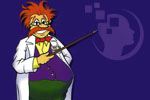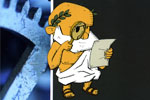"Logic! Why don't they teach logic at these schools?"
— C.S. Lewis, The Lion, the Witch and the Wardrobe
Logic is a system, or mode, of reasoning. Almost everyone uses logic, from the seven-year old questioning his parents, to the salesman promoting his wares, to the politician seeking election. The problem is, so few of us use it well.
As a school subject, logic is the study of the principles of reasoning: learning how to take statements you know are true, and combining them to come up with a conclusion you also know is true. Or, inversely, learning how to disprove conclusions from others that include statements you know are false.
Most people do not study logic systematically, but as Christians we must be able to logically defend our faith, to prove our doctrines from the Bible. We must be good stewards of our minds and seek wisdom. We must be imitators of Christ, and He was a logical man—the pharisees and scribes of His day could not refute His arguments or answer the logical dilemmas He set before them. What a mind He had! To be like Christ is the greatest reason to study logic.
For a very helpful and much more in-depth introduction to logic, we recommend downloading the booklet Learning Logic at Home. The booklet is out of print, and the reviews it includes are a little dated, but its overall content was invaluable to us.
Pre-Logic Books
To prepare for more formal logic, the abilities to observe, recognize, and describe characteristics; distinguish similarities and differences; and identify and complete sequences, classifications, and analogies—in short, to think critically—are invaluable. Even very young children can be taught to do these things.
 |
Building Thinking Skills Grades K-12
Probably the best course from the consistently excellent body of Critical Thinking Co. products, Building Thinking Skills focuses on critical thinking, sound reasoning, and creative problem solving rather than on logic as a formal academic subject. The exercises are engaging and thorough, and will help you shape excellent thinkers and communicators.
|
 |
Dr. Funster/Dr. Dooriddles Grades K-12
More supplementary than curricular, the Dr. Funster books present a variety of fun logic puzzles to heighten students' reasoning abilities. Kids complete shape sequences, solve acrostics, andwork through a variety of other logic problems in a matter of minutes per day. Dr. DooRiddles focuses exclusively on verbal reasoning skills in the form of short riddles students are to solve.
|
Informal Logic
From the start, logic can be divided into formal logic and informal logic. Informal logic is a more technical name for what is usually called "critical thinking." This modern branch of logic tries to take formal logic, and, by intermingling it with rhetoric, make it into something more palatable and useful. For this branch of logic, we carry the Critical Thinking series by Anita Harnadek, the books Fallacy Detective and Thinking Toolbox by the Bluedorn brothers, and the more in-depth Art of Argument & Argument Builder from Classical Academic Press.
 |
Christian Logic Grades 6-12
Wanting to equip Christians to counter bad arguments and construct good ones, Hans and Nathaniel Bluedorn offer two entertaining books and a DVD for teenage students (and their parents!). The texts are highly readable, and extensive exercises help cement concepts while offering realistic practice. Not an official curriculum, Christian Logic is nonetheless highly recommended.
|
 |
Classical Academic Press Logic Grades 7-12
For Christian students, Classical Academic Press introduces both informal and formal logic. The point isn't just to impart knowledge, but to do so in such a way that kids will be able to put the concepts they learn to use. The Art of Argument teaches students to spot fallacies; The Argument Builder shows them how to evaluate truth-claims; and The Discovery of Deduction explores formal logic.
|
 |
Critical Thinking Series Grades 7-12
Designed to give middle and high school students a practical yet thorough introduction to logic and good reasoning, the Critical Thinking series is a set of two books that look at bad arguments, good arguments, the logic (or lack thereof) present in propaganda, etc. Students are to engage in honest dialogue, rather than simply jotting down answers to exercises workbook-style.
|
Formal Logic
Formal logic splits into two fundamentally different types of reasoning: deductive and inductive.
Deductive reasoning is the logic of proving things for certain. With deductive reasoning, you can start with a few true statements, then deduce more statements which you know are also true. You can also analyze arguments to see if they are valid. When studying the deductive branch of formal logic, you will study logical statements, fallacies, syllogisms, and other elements.
For an introduction and some great deductive reasoning practice, we offer the Mind Benders series. (Sudoku puzzles are also great for this sort of practice.) If you're ready to study more formally, look at Discovery of Deduction from Classical Academic Press, or the Canon Press or Memoria Press logic.
 |
Mind Benders Grades Preschool-12
These are some of the bestselling logic products at Exodus Books. Rather than a rigorous curriculum, these (recenty updated) worktexts present series of grid puzzles to sharpen students' deductive reasoning abilities. Because these are more like games than schoolwork, they're a great way to get young or not-so-young students prepped for more serious logic study.
|
 |
Introductory and Intermediate Logic Grades 7-12
Bringing together DVD lectures and student text, Introductory and Intermediate Logic is a high-level program from James B. Nance. Logic, he says, is about form more than it is about content, and he teaches with a thoroughness many college professors fail to achieve. These aren't super exciting, but if you want to know how to do rigorous, formal logic, you need this program.
|
 |
Memoria Press Logic & Rhetoric Grades 7-12
Casting logic as a language arts, rather than a mathematics, subject, Martin Cothran guides older students through the art of argument construction. Two books cover formal logic, while a third presents material logic (what most people call informal logic). Cothran uses worktexts, DVDs, and other texts (like Aristotle's Rhetoric) to ensure kids understand these often difficult concepts.
|
The other branch of formal logic is inductive logic, which is completely different than deductive. While deductive reasoning proves things for certain, inductive reasoning evaluates the evidence in a scientific way to demonstrate that an argument is probably true or false. Hypothetical Scientific theories, probability and statistics are all branches of this, as are analogies.
We have very little for this type of logic; the only series touching upon it is Analogies, which is half logic/half vocabulary.
 |
EPS Analogies Grades K-12
Covering all the grades, these workbooks don't teach logic so much as clear and imaginative thinking. Students make connections between pictures, pictures and words, and words. The exercises are logic-based, but they don't teach kids how to spot fallacies or build airtight arguments, making these excellent texts for preparing students for more rigorous study.
|
Review by C. Hollis Crossman
C. Hollis Crossman used to be a child. Now he's a husband and father who loves church, good food, and weird stuff. He might be a mythical creature, but he's definitely not a centaur. Read more of his reviews
here.
Did you find this review helpful?